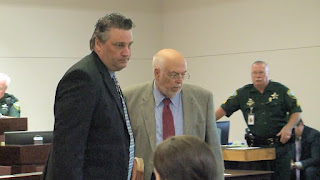Innocent? You might not get a fair trial.
I admire the podcasters who can bring true crime cases alive for people. And certainly there have been many, many podcasts made about the Frasch case.
Not my gift, though. I do better putting my thoughts on paper, so to speak. Which is why during the pandemic I ended up looking into the Dr. Adam Frasch case.
At the time I was writing to an inmate in Florida—something I had gotten into through an online ministry—and he had just gotten a new cellmate, the well-known Dr. Adam Frasch. Well-known to most of Florida, that is. Not to me up in Canada. My friend in prison had a lot to say about him. It was the lockdown and the two men were stuck in a cell all day together with nothing to do but talk. My friend asked me to look online and tell him more about the Frasch case. He wanted to determine whether his cellmate was guilty or innocent. He knew that Doc, as he was called in prison, maintained his innocence, but was it really true?
Initially I found it an onerous request. I certainly enjoy a good Agatha Christie and in my youth, I read my share of Perry Mason novels. But as a full-time mom trying to survive the new world order of the pandemic, I wasn’t in any frame of mind to apply any investigative skills I might have picked up from these stories to a real-life crime drama.
However, a Canadian inability to outright refuse a request caused me to make a perfunctory Google search. And I began to read what the Tallahassee Democrat had to say about the case.
Travesty of Justice: The Dr. Adam Frasch Case goes into how I went from that half-hearted state of mind to one of reading everything I could find online—police reports, autopsy—and watching everything I could find online—documentaries, witness interviews, and of course, the full trial. (Thank you YouTube.)
In the end, it left me terrified. What I was discovering in the original investigation didn’t line up with the prosecutor’s case.
I wrote Travesty of Justice: The Dr. Adam Frasch Case because I’m convinced that none of us are really safe if law enforcement decides that we did it. Important evidence was ignored. Some “evidence” was just outright fabricated. And it’s all verifiable if one just goes through all of the Florida State's documents and videos related to the case.
Just as disturbing to me was how the mainstream media didn’t question it and went along with the prosector's scenario of what happened leading up to and on the day of Samira Frasch's death. Prosecutor Georgia Cappleman took the emotive and somewhat smug stand that she was speaking for the dead.
They say that 9 times out of 10 it’s the spouse who did it. I think it’s far more accurate to say that 9 times out of 10 it’s the spouse who goes to prison for it whether they did it or not.
After looking into the Frasch case, I contacted a few other people who continued to proclaim their innocence from prison. What disturbed me was that they had similar stories. Brady violations, where the State (who is the one who does the investigation) withholds exonerating evidence from the defense is the biggest commonality in these cases.
I wish all the podcasters who covered the Frasch case and presented the prosecutor’s version of events on the day of Samira's death had the time to look into ALL of the evidence, especially what didn’t come out in the trial. If so, we might have more of a public outcry at the way the State can put a man in prison for a murder he couldn’t have committed.



Comments
Post a Comment